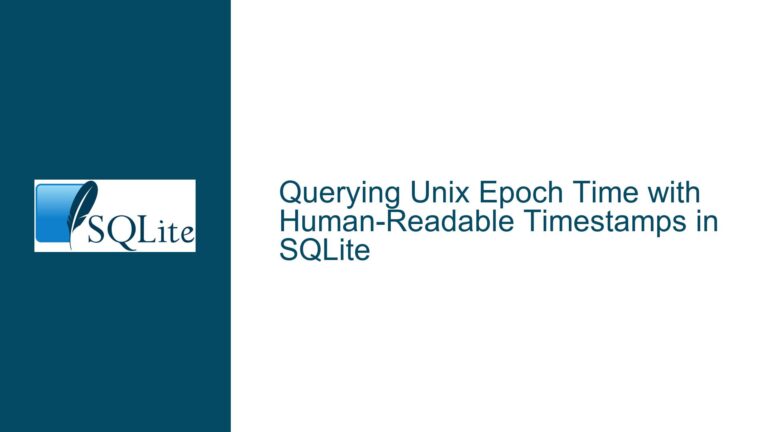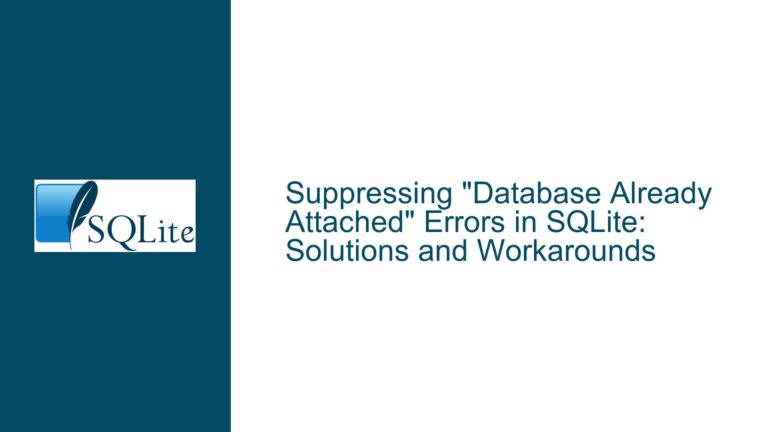group_concat() NULL Handling with rowid in SQLite Left Joins
Issue Overview: group_concat() Omits NULL rowid Values in Left Join Aggregation
When utilizing SQLite’s group_concat() aggregate function in conjunction with LEFT JOIN operations, developers may encounter unexpected behavior where NULL values from the joined table’s rowid are omitted from the concatenated result. This contrasts with other columns in the same query, where NULLs may appear as literal ‘NULL’ strings when wrapped with functions like quote(). The root of this behavior lies in three interconnected aspects:
- Aggregation Semantics: The
group_concat()function explicitly skips NULL values during concatenation unless those NULLs are converted to non-NULL representations. - Left Join Mechanics: Outer joins (e.g.,
LEFT JOIN) introduce NULL placeholders for unmatched rows in the joined table, affecting system columns likerowid. - rowid Specifics: SQLite’s
rowidpseudo-column normally guarantees non-NULL values for physical rows, but outer joins and virtual NULLs create exceptions to this rule.
In the provided scenario, a query aggregates data from t1 left-joined to t2 and t3, with group_concat() applied to both t3.rowid and t3.foo2_id. The t3.rowid concatenation omits NULLs by default, while quote(t3.rowid) includes ‘NULL’ strings. This discrepancy arises from how SQLite processes NULLs at the aggregation layer versus how functions like quote() manipulate values before aggregation.
Possible Causes: NULL Propagation vs. rowid Constraints in Join Contexts
Cause 1: group_concat() Inherent NULL Filtering
The group_concat() function adheres to SQL standard aggregation rules, which dictate that NULL values are excluded from the concatenation process. This behavior is documented but often overlooked when developers expect NULLs to appear as placeholders. For example:
-- NULLs are skipped:
SELECT group_concat(NULL) FROM (VALUES (1)); -- Result: (empty string)
-- Non-NULLs are included:
SELECT group_concat('NULL') FROM (VALUES (1)); -- Result: 'NULL'
Cause 2: rowid NULLability in Outer Joins
While rowid typically represents a physical row’s immutable identifier, outer joins generate NULL values for columns in unmatched joined tables. When t3 has no matching row in a LEFT JOIN, t3.rowid becomes NULL for that specific join context, even though rowid cannot be NULL in its source table. This creates a paradox where a normally non-NULL system column appears NULL in query results due to join mechanics.
Cause 3: quote() Function Masking NULLs
The quote() function converts SQL NULLs into the string ‘NULL’, effectively transforming them into non-NULL values. This allows group_concat() to include them in the output:
-- Without quote():
SELECT group_concat(t3.rowid) FROM ...; -- NULLs excluded
-- With quote():
SELECT group_concat(quote(t3.rowid)) FROM ...; -- 'NULL' included
This distinction explains why the original query exhibits different behaviors for t3.rowid and t3.foo2_id when quote() is applied.
Troubleshooting Steps, Solutions & Fixes: Controlling NULL Representation in Aggregated Joins
Step 1: Validate NULL Sources in Joined Data
Before addressing aggregation, confirm whether NULLs originate from the join logic or underlying data. Execute a non-aggregated version of the query to inspect raw results:
SELECT
t1.id,
t3.rowid AS t3_rowid,
t3.foo2_id
FROM t1
LEFT JOIN t2 ON t2.foo1_id = t1.id
LEFT JOIN t3 ON t3.foo2_id = t2.id;
If t3_rowid contains NULLs, they stem from unmatched rows in the LEFT JOIN to t3, not from t3 itself. This confirms the NULLs are artifacts of the join operation.
Step 2: Decide on NULL Representation Strategy
Choose how to represent unmatched rows in aggregated results:
- Omit NULLs: Use raw
group_concat(t3.rowid)to exclude unmatched rows. - Include ‘NULL’ markers: Wrap columns with
quote()orcoalesce():SELECT group_concat(coalesce(t3.rowid, 'NULL')), group_concat(quote(t3.foo2_id)) FROM ... - Custom placeholders: Replace NULLs with application-specific values:
group_concat(coalesce(t3.rowid, -1))
Step 3: Address rowid Ambiguity in Joins
Recognize that rowid NULLs in outer joins do not indicate corrupt data but reflect join non-matches. If preserving join topology is critical, use a compound key that includes existence flags:
SELECT
group_concat(CASE WHEN t3.id IS NULL THEN 'missing' ELSE t3.rowid END),
...
Step 4: Standardize Column Handling
Apply consistent NULL handling across all aggregated columns to avoid mismatched representations. For example, if using quote() for one column, apply it to all:
SELECT
group_concat(quote(t3.rowid)),
group_concat(quote(t3.foo2_id)),
...
Step 5: Verify Schema and Index Impact
Ensure that missing joins aren’t caused by incorrect schema relationships. For instance, verify foreign key constraints if applicable:
-- Add foreign keys (if not already present):
CREATE TABLE t2 (
id INTEGER PRIMARY KEY,
foo1_id INTEGER REFERENCES t1(id)
);
CREATE TABLE t3 (
id INTEGER PRIMARY KEY,
foo2_id INTEGER REFERENCES t2(id)
);
While foreign keys don’t directly affect group_concat() behavior, they enforce join validity, reducing unexpected NULLs from referential integrity issues.
Final Solution: Explicit NULL Handling with Coalesce
For predictable results across all SQLite versions and scenarios, explicitly convert NULLs before aggregation:
SELECT
group_concat(coalesce(t3.rowid, 'NULL')),
group_concat(coalesce(t3.foo2_id, 'NULL'))
FROM t1
LEFT JOIN t2 ON t2.foo1_id = t1.id
LEFT JOIN t3 ON t3.foo2_id = t2.id
GROUP BY t1.id;
This approach eliminates reliance on quote()-specific behavior and ensures clarity in the output format.






